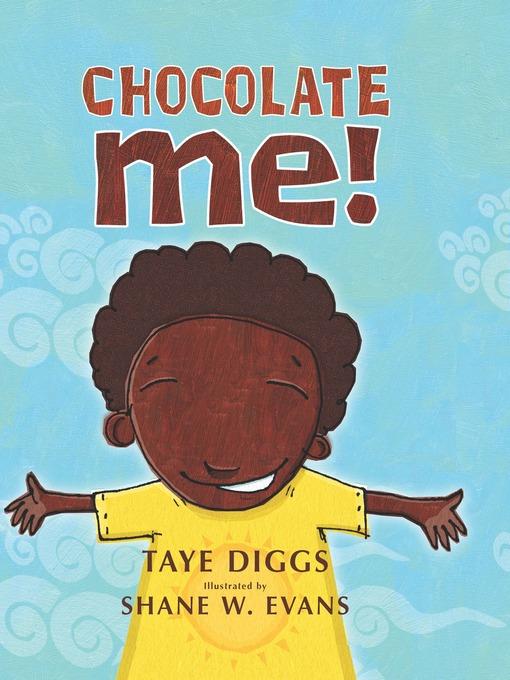
Chocolate Me!
فرمت کتاب
ebook
تاریخ انتشار
2011
Reading Level
0-1
ATOS
2.1
Interest Level
K-3(LG)
نویسنده
Shane W. Evansناشر
Feiwel & Friendsشابک
9781466800267
کتاب های مرتبط
- اطلاعات
- نقد و بررسی
- دیدگاه کاربران
نقد و بررسی

adidas - never read it but it looks yummmmmy

July 25, 2011
It's tough being the only African-American kid on the block. The young narrator's white acquaintances tease him ruthlessly about his name, his dark skin ("It's brown like dirt. Does it hurt to wash off?"), his wide nose, and his 'fro. It's enough to make any kid wish he were just like everyone elseâuntil Moms offers just the right kind of comfort: "You have skin like velvet fudge frosting mixed in a bowl.... Cotton candy hair soft to the touch of my fingertips." The titular phrase is used like a refrain, initially a burden and later a celebration of self. Actor Diggs, making his children's book debut, gives an unvarnished take on the emotional impact of taunting that cuts to the core of one's identity, though not every reader will find satisfaction in the ending, in which the narrator is reconciled with his insensitive peers over chocolate cupcakes. But Evans makes the
hero's journey to confidence irresistible, with bighearted, stylized pictures that draw on the emotionally exuberant vocabulary of street art and anime. Evans doesn't minimize the cruelty the boy suffers, but he makes it feel surmountable. Ages 4â8.

August 15, 2011
Dark-skinned children are more likely to be confused than comforted by this unvarnished esteem-builder.
Looking sheepish and unhappy in the pictures but sounding angry, a young boy cites teasing comments from lighter-skinned peers about his skin color, hair and other features. "I squirmed and wiggled / as they giggled at my teeth so white. / 'You can be our flashlight at night. / Just smile and we'll be alright.' " The emotional skies clear, though, after his mother supplies both a pep talk ("Look in the mirror and / love what you see!") and a plate of chocolate cupcakes to share with his erstwhile tormentors. Evans, too, sends a mixed message in the ways he portrays the figures he poses against sketchy urban backdrops. Opposite the line about the narrator's "flashlight," the boy's teeth are both hardly visible (in contrast to the whites of his big, bright eyes) and colored a lower-contrast ivory to boot, and in several scenes his mouth is so inconspicuous and oddly placed that his nose might be mistaken for smiling lips. More troubling, to judge from their postures and expressions, the other children's mockery may come across to readers as just friendly banter—particularly in light of a final scene that is all frosting-smeared happy faces and mutual amity—instead of the hurtful words the narrator perceives.
Self-worth is always worth bolstering, but the positive message here is clouded by muddled subtexts and visual cues. (Picture book. 6-8)
(COPYRIGHT (2011) KIRKUS REVIEWS/NIELSEN BUSINESS MEDIA, INC. ALL RIGHTS RESERVED.)

December 1, 2011
PreS-Gr 2-A young African-American boy feels unhappy and self-conscious because of comments other boys make about his skin color, his hair, his nose, and even his white teeth. At home he asks his Moms, "Why can't I be more like Timmy or Johnny or Mark/with straight hair and a different nose?/I suppose my teeth wouldn't seem so bright/if my skin were a bit more light...right?" His mother reassures him by comparing his attributes to things he can relate to: "You have skin like velvet fudge frosting/....Cotton candy hair soft to touch..../And your smile....It's perfect." When the boy looks at himself in the mirror, he sees what his mother sees and loves "Chocolate me!" He shares his mother's chocolate cupcakes with the boys who have been teasing him. The protagonist is now happy with who he is, but youngsters may be left wondering, other than enjoying the treat, have the other boys changed? The cartoonlike illustrations are done in bold colors. Several spreads have only two words, "Chocolate me," in brown letters and show the boy wearing one of a variety of T-shirts with a message on it: "Be Super!" "You are my" (page turn) "#1" (page turn) "#1 Son!" With its universal themes of wanting to fit in, self-acceptance, and self-esteem, this read-aloud offering is sure to strike a chord with many young readers/listeners, and on a variety subjects, not just race.-Mary N. Oluonye, Shaker Heights Public Library, OH
Copyright 2011 School Library Journal, LLC Used with permission.

February 1, 2012
Preschool-G Actor Taye Diggs remembers his childhood in a mostly white neighborhood with this sweet paean to self-love. A five-year-old boy finds hanging out with his white friends upsetting. When we'd play, they'd say, Look where your skin begins! It's brown like dirt. Does it hurt to wash off?' Each one of these innocent, though uncomfortable, questionsabout the boy's hair, his wide nose, and his bright white teethare met with a despondent illustration and the chorus: Chocolate me. The lack of exuberance these two words carries a carefully controlled tension, as if the boy has been through this before and a hatred of his own body is beginning to fester. Of course, a pep talk with his mother turns that morose refrain into a joyous exclamation, and soon he is happily cavorting with his less-chocolaty friends. Diggs draws emotion from simplicity, while Evans' visible brushstrokes in the boy's skin and in the spirals of his hair let the audience know that he is a beautiful kid, far before the kid himself figures it out.(Reprinted with permission of Booklist, copyright 2012, American Library Association.)

























دیدگاه کاربران